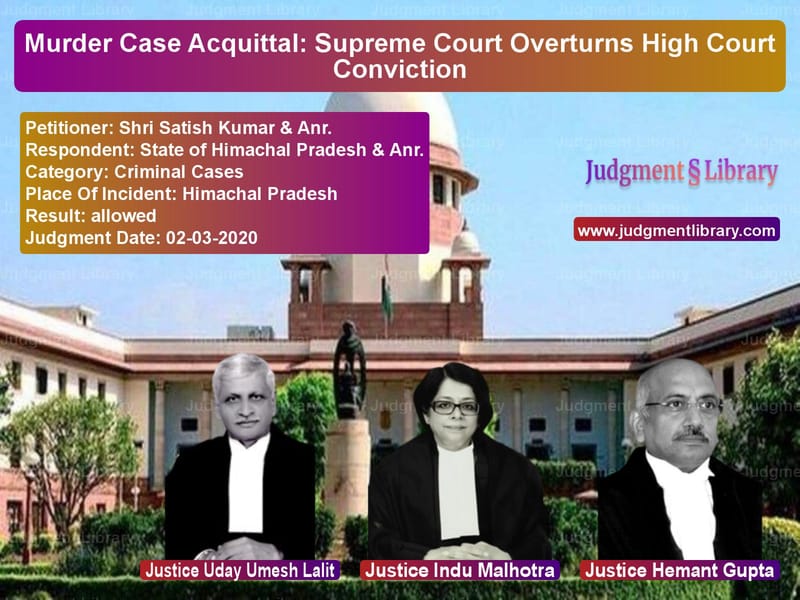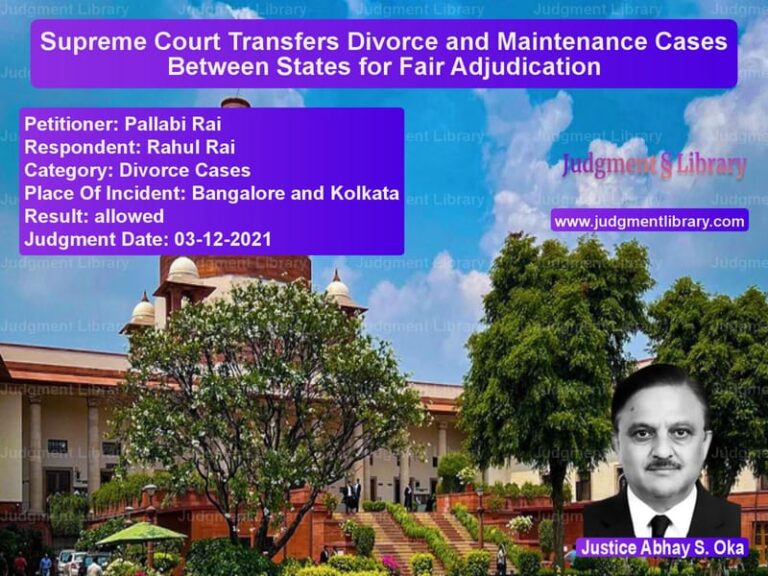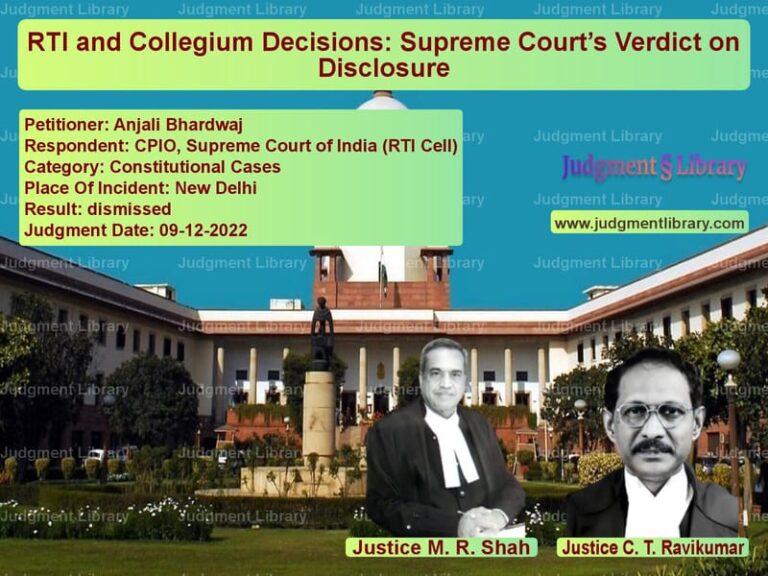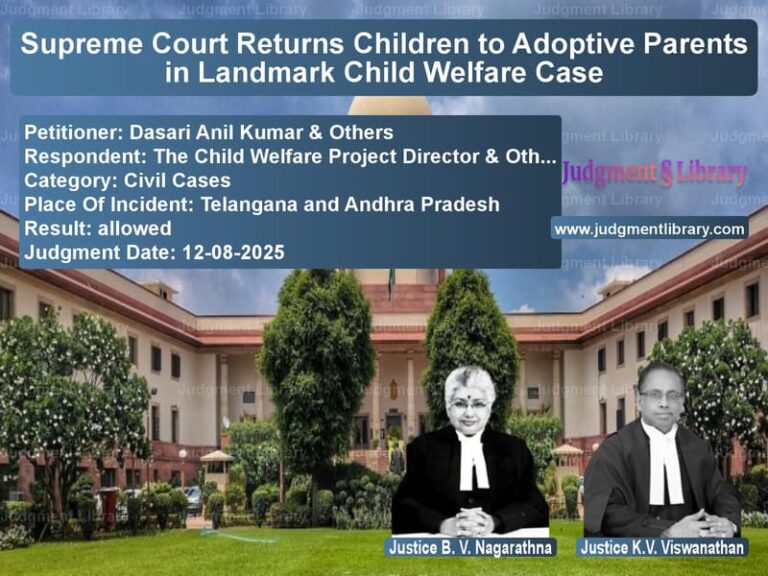Murder Case Acquittal: Supreme Court Overturns High Court Conviction
The Supreme Court of India, in its judgment dated March 2, 2020, overturned the conviction of Satish Kumar and Rajeev Kumar by the High Court of Himachal Pradesh and reinstated the trial court’s decision to acquit them. The case involved allegations of murder under Section 302 read with Section 34 of the Indian Penal Code (IPC) and violations under Sections 25 and 27 of the Arms Act, 1959.
Background of the Case
The case originated on December 22, 2009, when an information was received by Inspector Ram Singh at around 07:15 AM about the alleged murder of Ratti Ram. The police registered FIR No. 218 based on a statement given by Neelam Sharma, the daughter of the deceased.
Neelam Sharma stated that her father had left home on December 21, 2009, at around 8 AM, informing her that he would visit a friend’s house and later go to his workplace. However, he did not return home, and his mobile phone was switched off. The next morning, she called a forest guard to check whether her father had reported to duty, and upon learning that he had not, she made further inquiries. She then called Satish Kumar, the accused, to obtain the contact number of her father’s friend. Later that day, the police informed her that her father had been found dead with gunshot wounds in a forest area.
Legal Proceedings
Trial Court’s Findings
- The trial court acquitted the accused, holding that the prosecution failed to establish their guilt beyond a reasonable doubt.
- It noted that the police already had prior knowledge about the location of the dead body before recording the accused’s disclosure statements.
- The trial court observed that the chain of circumstances was not conclusive and that the evidence did not rule out other possibilities.
- It rejected the admissibility of the accused’s alleged confessions, concluding that they were not voluntary.
High Court’s Ruling
- The High Court reversed the acquittal and convicted the accused, relying on circumstantial evidence.
- It held that the recovery of the dead body and the firearm used in the crime were strong incriminating factors.
- The High Court found that the forensic report confirmed the gun recovered from the accused’s house was used in the murder.
- It ruled that even if only one of the accused fired the gun, the other was equally responsible under Section 34 IPC.
Petitioner’s Arguments (Satish Kumar & Rajeev Kumar)
- The defense contended that the prosecution failed to establish an unbroken chain of circumstances linking the accused to the crime.
- They argued that the police had prior knowledge of the dead body’s location, making the accused’s disclosure statements inadmissible under Section 27 of the Indian Evidence Act.
- The defense pointed out inconsistencies in witness testimonies, especially regarding the sequence of events leading to the discovery of the body.
- They challenged the credibility of Neelam Sharma’s statement, arguing that she initially had no knowledge of who committed the murder but later named the accused.
Respondent’s Arguments (State of Himachal Pradesh)
- The prosecution emphasized that the dead body was recovered based on the accused’s disclosure statements.
- They relied on forensic evidence linking the recovered gun to the crime.
- The prosecution argued that the accused had a motive related to a long-standing land dispute with the deceased.
- They maintained that the High Court correctly overturned the trial court’s ruling based on the weight of the evidence.
Supreme Court’s Observations
1. No Direct Evidence
The Supreme Court noted that the case was based entirely on circumstantial evidence. Citing the principle laid down in Sharad Birdhichand Sarda v. State of Maharashtra, it emphasized that:
“The circumstances from which the conclusion of guilt is to be drawn should be fully established and should be consistent only with the hypothesis of the guilt of the accused.”
2. Inconsistencies in Prosecution Evidence
- The Court found contradictions in witness testimonies, particularly regarding when the police first learned about the dead body’s location.
- It questioned how Neelam Sharma could name the accused before any investigation had taken place.
- The Court observed that the trial court had correctly pointed out that the police already knew where the body was before recording the accused’s statements.
3. Failure to Establish Guilt Beyond Reasonable Doubt
The Supreme Court ruled that the prosecution failed to conclusively establish who fired the fatal shot, stating:
“In the absence of evidence as to which of the two accused fired upon the deceased, the accused cannot be convicted only on the basis of the recovery of the gun.”
4. High Court’s Erroneous Interference
- The Court emphasized that an appellate court should not overturn an acquittal unless the trial court’s findings are perverse.
- It reiterated the principle from Chandrappa v. State of Karnataka, which states that an accused is entitled to a double presumption of innocence in cases of acquittal.
- The Supreme Court held that the High Court merely took a different view of the evidence, which was not sufficient to overturn the trial court’s decision.
Final Verdict
The Supreme Court set aside the conviction of the accused, stating:
“The prosecution has failed to prove the role of the accused in causing the death of the deceased Ratti Ram. In the absence of any evidence as to who fired the fatal shot, the benefit of doubt must go to the accused.”
The Court restored the trial court’s acquittal order and directed the immediate release of the accused, if not required in any other case.
Petitioner Name: Shri Satish Kumar & Anr..Respondent Name: State of Himachal Pradesh & Anr..Judgment By: Justice Uday Umesh Lalit, Justice Indu Malhotra, Justice Hemant Gupta.Place Of Incident: Himachal Pradesh.Judgment Date: 02-03-2020.
Don’t miss out on the full details! Download the complete judgment in PDF format below and gain valuable insights instantly!
Download Judgment: Shri Satish Kumar & vs State of Himachal Pr Supreme Court of India Judgment Dated 02-03-2020.pdf
Direct Downlaod Judgment: Direct downlaod this Judgment
See all petitions in Murder Cases
See all petitions in Bail and Anticipatory Bail
See all petitions in Judgment by Uday Umesh Lalit
See all petitions in Judgment by Indu Malhotra
See all petitions in Judgment by Hemant Gupta
See all petitions in allowed
See all petitions in supreme court of India judgments March 2020
See all petitions in 2020 judgments
See all posts in Criminal Cases Category
See all allowed petitions in Criminal Cases Category
See all Dismissed petitions in Criminal Cases Category
See all partially allowed petitions in Criminal Cases Category







